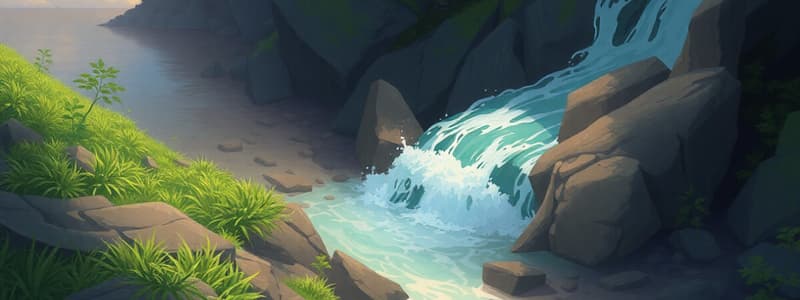Podcast
Questions and Answers
What happens to water that becomes runoff in the water cycle?
What happens to water that becomes runoff in the water cycle?
- It evaporates immediately into the atmosphere.
- It is entirely absorbed by the soil.
- It flows across the surface to a lower location. (correct)
- It gets converted into ice or snow.
What is a key factor that influences the occurrence of runoff?
What is a key factor that influences the occurrence of runoff?
- Temperature of the air.
- Humidity levels in the environment.
- Wind speed.
- Soil type. (correct)
How does infiltration differ from runoff in the water cycle?
How does infiltration differ from runoff in the water cycle?
- Infiltration involves water saturating the soil, while runoff involves water flowing on the surface. (correct)
- Infiltration only occurs during heavy rains.
- Infiltration occurs at a slower rate than runoff.
- Infiltration is responsible for moving water into oceans.
What initiates the water cycle process?
What initiates the water cycle process?
What is the primary cause of water moving from higher to lower locations in runoff?
What is the primary cause of water moving from higher to lower locations in runoff?
What happens to water if it falls on a non-porous surface?
What happens to water if it falls on a non-porous surface?
How does the steepness of land affect water runoff?
How does the steepness of land affect water runoff?
What is the main consequence of runoff transporting pollutants?
What is the main consequence of runoff transporting pollutants?
What role does vegetation play in water infiltration?
What role does vegetation play in water infiltration?
Which process refers to the movement of water down into the soil?
Which process refers to the movement of water down into the soil?
What occurs during erosion related to water runoff?
What occurs during erosion related to water runoff?
What generally happens to water that seeps into the soil over time?
What generally happens to water that seeps into the soil over time?
During which situation is runoff most likely to occur?
During which situation is runoff most likely to occur?
Why can runoff increase dramatically during a monsoon season?
Why can runoff increase dramatically during a monsoon season?
How does soil temperature affect infiltration rates?
How does soil temperature affect infiltration rates?
Flashcards
Runoff
Runoff
Water that flows over the ground surface instead of soaking into the soil.
Infiltration
Infiltration
Water soaking into the soil and moving through the ground.
Runoff path
Runoff path
The route water takes flowing across the surface to lower elevations.
Runoff's role
Runoff's role
Signup and view all the flashcards
Soil type and runoff
Soil type and runoff
Signup and view all the flashcards
Non-porous surface
Non-porous surface
Signup and view all the flashcards
Erosion
Erosion
Signup and view all the flashcards
Deposition
Deposition
Signup and view all the flashcards
Runoff's impact on the landscape
Runoff's impact on the landscape
Signup and view all the flashcards
Factors affecting infiltration
Factors affecting infiltration
Signup and view all the flashcards
Water table
Water table
Signup and view all the flashcards
Aquifers
Aquifers
Signup and view all the flashcards
Study Notes
Runoff in the Water Cycle
- Definition: Runoff is the water that flows over the land surface, unable to be absorbed into the ground. It moves downhill to streams, rivers, and eventually the ocean.
- Mechanism: Precipitation (rain, snow, etc.) that exceeds the ground's absorption capacity becomes runoff. This occurs when the ground is already saturated, rainfall is intense, or the surface is impermeable (e.g., concrete, asphalt).
- Factors Affecting Runoff:
- Soil type: Porous soils (e.g., sand) allow more infiltration than non-porous soils (e.g., granite).
- Precipitation rate: Faster rainfall leads to more runoff as the ground can't absorb it quickly enough.
- Slope: Steeper slopes cause faster runoff.
- Vegetation: Vegetation increases infiltration, reducing runoff.
- Runoff Process: Water travels from higher elevations to lower, collecting in ditches, creeks, and eventually rivers. It eventually reaches the ocean.
- Impact of Runoff:
- Erosion: Moving water erodes land, carrying soil, rocks, and nutrients downstream. This can damage farmlands and transport pollutants.
- Pollution Transport: Runoff picks up pollutants from various sources (lawns, roads, etc.) and carries them downstream to water bodies, impacting aquatic life.
- Landscape Change: Runoff shapes landscapes over time through erosion and deposition (the process of leaving material).
Infiltration in the Water Cycle
- Definition: Infiltration is the process of water soaking into the ground.
- Mechanism: Water percolates through the soil and rock, filling pore spaces and cracks. This process is influenced by gravity and capillary action.
- Factors Affecting Infiltration:
- Porosity: The amount of pore space/air in the soil impacts how much water can be stored.
- Permeability: The ability of the soil to transmit water influences how quickly water moves through it.
- Vegetation: Roots encourage infiltration and soil structure.
- Slope: Gradual slopes lead to increased infiltration time.
- Soil Temperature: Warmer soil generally has a higher infiltration rate.
- Infiltration Process: Water enters the soil and gradually moves downward. This replenishes groundwater and creates aquifers, vital for drinking water.
- Impact of Infiltration:
- Groundwater Recharge: Infiltration replenishes groundwater supplies.
- Plant Water Use: Water in the upper soil layers is accessible for plant roots.
Runoff vs. Infiltration
- Runoff and infiltration are two key processes in the water cycle which compete for the same source water.
- Runoff occurs when the precipitation rate is faster than the ground's ability to absorb the water.
- Infiltration occurs when precipitation can be stored or absorbed by the ground.
- Both processes are affected by various soil types, vegetation, and slope of the land.
Studying That Suits You
Use AI to generate personalized quizzes and flashcards to suit your learning preferences.




